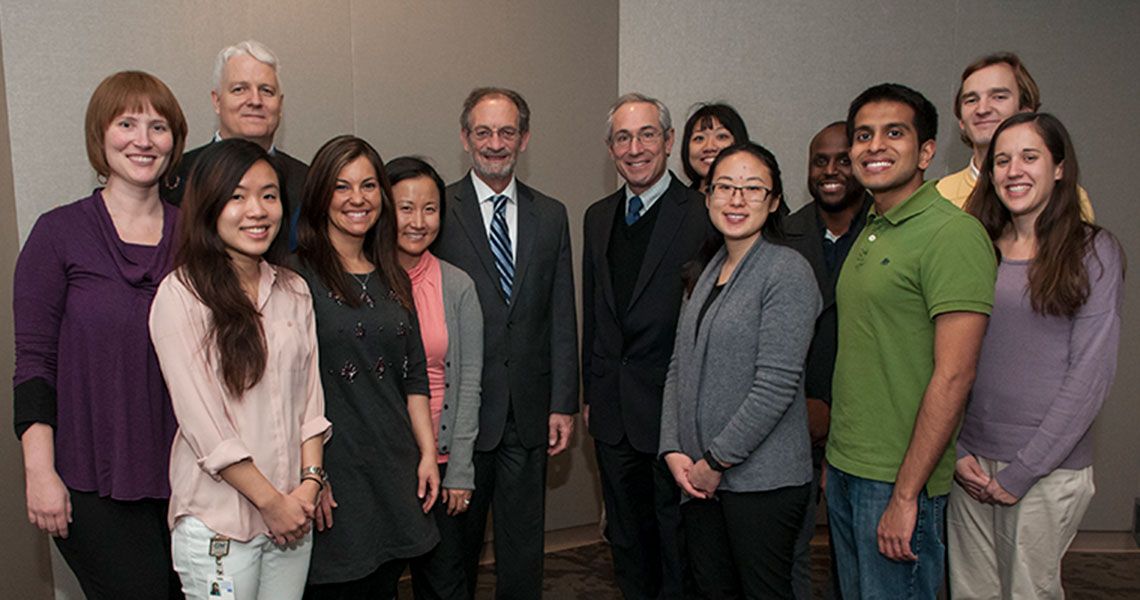“Suicide rates are largely unchanged over the last 20 years,” said Thomas Insel, M.D., director of the National Institute of Mental Health (NIMH). “There were 39,000 suicides reported in 2012,” he said during the 12th Annual Jerry M. Wiener, M.D. Lecture in Psychiatry and Behavioral Sciences, Nov. 20. He suggested that mental health and suicide represented one of the more significant public health concerns in the United States. Those statistics, he added, are “more than double the rate of homicide; it’s more than the rate of deaths from traffic fatalities; it’s actually more than deaths from cancer except lung, breast, and colon.”
The endowed lecture celebrates more than two decades of service to GW’s School of Medicine and Health Sciences (SMHS) Department of Psychiatry and Behavioral Sciences by Wiener as professor and chair of the department. Established in 1996, by Wiener and his wife Louise, the Jerry M. Wiener Jerry M. Wiener Endowed Fund for Psychiatric Education supports and advances programs designed to enhance psychiatric education in the fields of residency training, medical education, and primary care.
“He certainly was deeply committed to training and to public policy,” recalled Louise. “I think he would be pleased with his legacy and the work the department is doing today.”
“We have failed to bend the curve for morbidity and mortality from mental illness,” said Insel, addressing his audience of SMHS faculty, students, and residents. He cited lack of access and accountability, as well as fragmentation and criminalization of mental illness for this.
“More people are getting more of today’s treatments, but the fact is our outcomes really aren’t any better,” said Insel, during his talk, titled “Psychiatry 2024.” He continued, adding, “If you double the amount of people getting any of our medications the suicide rate doesn’t budge.”
Insel stressed the need to not only improve access and quantity, but to improve options and quality. The field can take advantage of two great changes, said Insel, revolution in genomics and President Obama’s brain initiative.
“We are at this fascinating point with the genomic revolution,” explained Insel, “rather than thinking about the biology based on the drugs that have been given and saying ‘maybe people with Schizophrenia have too little thorazine in their brain or maybe depression means you are a quart low in serotonin,’ what we have been able to do is ask nature itself.”
There is much more work to be done in this genomic revolution according to Insel. “What we are looking at now is a whole new biology, a whole new realm of candidates that we would not have known existed let alone known could have been related to mental illness.”
Sadly, Insel believes we still don’t know enough to ensure prevention, recovery, or a cure for many people with severe mental illness. “If we are going to make a difference and bend that curve we are going to have to do two things: figure out a way to use all this to transform diagnostics and therapeutics.” That’s the real challenge, he explained. “Bringing all this to the clinic in a way that doesn’t make health care more expensive and less accessible but it makes it more efficient with much better outcomes.”
There is hope on the horizon. Insel cited the NIMH research project called Recovery After an Initial Schizophrenia Episode (RAISE). “This is probably the most exciting thing NIMH has done in the last decade,” he said. The project was created to fundamentally alter the trajectory and prognosis of schizophrenia through coordinated and aggressive treatment in the earliest stages of illness. RAISE focuses on psychosocial therapies, family involvement, rehabilitation services, and supported employment. The project was rolled out into community health centers in 22 states at 37 centers.
The public health burden of mental illness demands a different approach based on better options and better quality, according to Insel, adding that today’s treatments are just not good enough. “I do believe that genomics and neuroscience can make the difference; however, the reality is that this takes time,” he said. “To get patients, families, providers to be the engines of change would be fantastic and can accelerate research.”



